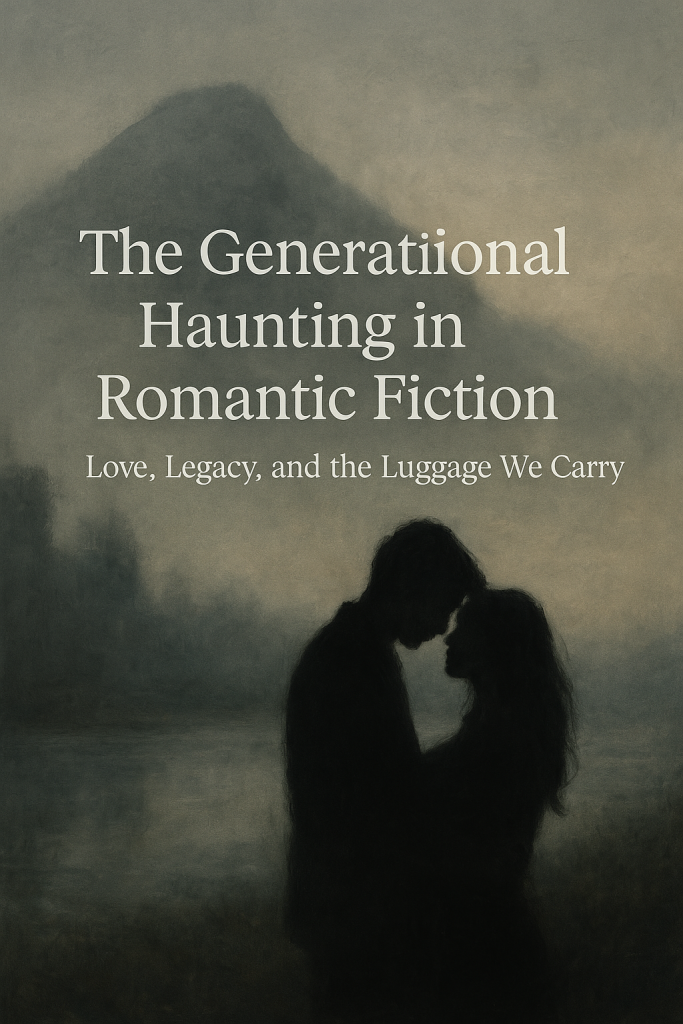Generational Haunting in Romantic Fiction

Generational Haunting in Romantic Fiction
A deeper look into how inherited trauma weaves through our love stories.
When we think of romantic fiction, our minds often turn to starry-eyed lovers, heart-fluttering moments, and dramatic breakups. But for many writers—and readers—romance is more than escapism. It’s a mirror reflecting the unresolved histories we carry within us. And sometimes, those histories aren’t our own.
The characters who live them shape romantic stories—and those characters often carry the weight of generations. The pain and silences of parents, the sacrifices of grandparents, the wounds that were never spoken of but somehow seep into how we love, how we trust, and how we protect ourselves.
In my own novels, these echoes are ever-present.
In Sun on Your Back, Diara grows up in the shadow of a secret too monstrous to name the truth about her father, and the betrayal buried beneath the polished veneer of her family. When her mother confesses to killing him, it triggers a deep unravelling—not just of the present, but of the past Diara thought she knew. As she pieces together the history that shaped her, Diara understands how trauma can masquerade as tradition, and how silence can hollow out the most fundamental truths of love and loyalty. Her romantic life is marked by uncertainty, a lack of rootedness, a deep yearning for safety. But even in love, she distrusts—because how can you fully open your heart when your upbringing made you question love’s appearance?
And then there’s Mist and Unappeased Spirits—a story haunted in every sense. Ara, a final-year medical student from Zimbabwe, carries her own emotional inheritance. Orphaned at three, raised by a loving but protective aunt, Ara has learned to guard herself. When she meets William, an aristocratic Scottish rugby player recovering from a brain injury, there’s an instant connection—but it isn’t simple. Cultural and religious differences challenge their love but also the ghosts of expectation, addiction, grief, and the unspoken pasts they both carry.
William’s substance use—and his mother’s icy disdain for Ara—echo generational wounds on both sides. Ara represents everything Lady Robertson does not want for her son: a Muslim woman, a foreigner, someone with no social standing in aristocratic circles. William, meanwhile, is reeling from his own disconnection, unable to play rugby, unsure of his future, and pulled into a spiral that mirrors emotional patterns likely passed down to him.
Their journey to Mount Nyangani in Zimbabwe becomes more than just a physical one. The mountain, steeped in myth and mystery, forces them to confront not only the supernatural, but the unresolved pain they carry—individually and together. Ara’s visions, her connection to the mountain spirits, and William’s vanishing act aren’t just dramatic plot twists—they are metaphors for how trauma behaves. It conceals itself. Back it comes. It tests love in ways logic cannot explain.
These characters don’t fall in love in spite of their inherited trauma—they fall in love through it. And that’s what makes their stories meaningful.
I grew up in a world where intergenerational trauma was a quiet constant. Where children inherited not just land or names, but guilt, shame, fear, and survival instincts. You learn not to speak too loudly. Not to trust too easily. Not to want too much. And yet you do. You want love.
So how do you write about love when your characters are carrying a suitcase packed by generations before them?
You write it honestly.
You allow the silences to surface.
You let the healing feel slow.
You let the characters mess up, and then try again.
Readers have told me that the pain in my stories feels personal. Some have said, “I didn’t expect to cry during a love story.” And to that, I say: love stories are often where we hide our deepest truths. We let them unfold when someone’s vulnerability invites our own.
Some readers have told me that reading Sun on Your Back was painful—too painful, in fact. The painful memories the book evoked caused a few readers to give it a lower rating. And I understand that. Not every story is straightforward to read, especially when it reflects wounds we’ve buried deep. But for others, the same story offered recognition. Validation. They sensed that others acknowledged their silence. I didn’t write Diara’s journey to shock; I wrote it to honour the complexity of survival and the courage to persevere.
One of my favourite things about writing is this quiet conversation between author and reader: Do you see this? Do you feel it too?
And more often than not, the answer is yes.
If you’ve ever loved while carrying inherited pain, your story is important.
If you’ve ever had to parent yourself while building a new relationship—you’re not alone.
Whether you are writing, reading, or dreaming of love during your healing, you are welcome.
This is the romantic fiction I want to write. Not just hearts and flowers, but roots and ghosts, too.
Share your story—fictional or real—of how generational wounds shape love; I’m eager to hear it. Your voice might just be the start of another story waiting to be written.
A shorter version of this post first appeared on Medium.
Explore the books mentioned in this post:
Mist and Unappeased Spirits: Mist and Unappeased Spirits eBook : Khan, Naira: Amazon.co.uk: Kindle Store
Sun on Your Back: Sun On Your Back eBook : Khan, Naira: Amazon.co.uk: Kindle Store
Want to receive updates and behind-the-scenes reflections like this?